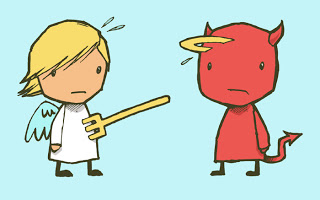Dear John:
I was wondering how you deal with the concept of original sin. I believe it is a corrupting idea that has led to much misery.
Being gay, I have experienced being on the receiving end of this doctrine, but I have also seen it undermine the self-worth of my parents, sisters, and members of my extended family. I have also seen how it is used by preachers to maintain power over their congregations. Also, without it, there would be no need for a redeemer or a blood sacrifice (which is barbaric).
An argument can be made that this notion (and the fear it generates) appears to be the glue that holds Christianity together. And it appears to the argument that fundamentalists use against gay people all of the time: human nature is flawed, you are evil, you need God’s love to be redeemed, etc. So, I guess my question is: Why should I believe in a system that generates fear—and then says that it offers “love” to solve the problem of the fear it generated. Wouldn’t it be simpler to believe in a system that says, “God loves you, and here is how to live a kind and loving life”?
With this one, lemme try doing that thing where I rerun the letter, inserting my thoughts in bracketed blue as I go along.
I was wondering how you deal with the concept of original sin. [I don’t trip about it, because I understand what the concept of original sin is supposed to be about; what it’s meant to reference. And what the concept of original sin is pointing toward—what the story of Adam and Eve is a metaphor/allegory for—is a reality that has zero to do with Christianity, and everything to do with a simple fact about human nature. And that fact is that all people are born with the will to survive. And what that necessarily means is that all people—Christian, Jew, Muslim, Buddhist, Hindu, atheist, insurance salesman, literally all people—come hardwired with a distinct and (let me stress) entirely natural predilection for a whole range of thoughts, emotions, and actions that are not exactly fueled by another thing that all humans are born with, which is a drive toward altruism. Every human will, time and time again, no matter how hard they strive not to, behave badly: they/we will be selfish, arrogant, greedy, rude, too quick to anger, overly defensive, obnoxiously intrusive, etc., etc. We all have an aspect of our core character that is less than stellar. What “born into sin” really means, or is supposed to mean, is born—period. If you’re human, you’re automatically born to sin—you have a sinful nature—insofar as “sin” means to do or even think something that hurts another person. In ways large and small, we all hurt someone every single day of our lives—which is to say we all, at one time or another, in one way or another, choose ourselves over someone else, even if (and usually especially) that someone is someone we love. We cannot help but do that. We cannot help that because we’re human.]
I believe it is a corrupting idea that has led to much misery. Being gay, I have experienced being on the receiving end of this doctrine, but I have also seen it undermine the self-worth of my parents, sisters, and members of my extended family. I have also seen how it is used by preachers to maintain power over their congregations. [Well, what’s actually corrupting isn’t the idea that all people are born to sin: all people are born to sin. What’s corrupting is the idea that there’s any way to stop sinning, to be and remain so pure and enlightened and in-tune with God, or whatever, that you rise above sinning. That is an abominably toxic idea, which leads to all manner of abuse. But the idea that one can elevate oneself above the state of sinfulness by doing, saying and/or thinking the right things is hardly unique to Christianity.]
Also, without it, there would be no need for a redeemer or a blood sacrifice (which is barbaric). [Well, there will always be a need for a “redeemer,” insofar as all people long to be rescued from that part of their nature that they wish wasn’t there. Again: a saving hero is hardly an exclusively Christian concept. And by “blood sacrifice,” of course you’re referring to the Christian doctrine of atonement. The atonement of Christ on the cross is indeed the cosmic phenomenon of which Christians avail themselves as a means of at least once more starting from scratch: of relieving the guilt that all humans feel for all the times they act rude and selfish and crazy towards others. That’s what “Christ died for our sins” means: that Christ took into himself—physically, into his body—all the bad karma that any human ever had, was, or will generate or caused to be generated, and then obliterated it all by allowing his body to be slaughtered. Christians believe that if they remember that God, as Christ, did that for them—that for them he sacrificed himself in that most dramatic and painful fashion—then they can … experience that truth, feel a whole lot better about things, and then get back out there and try to be worthy of that very intimate relationship with God. (And then, inevitably, fail at that, feel guilty about that failure, and return to the cross. That’s … the whole Christian life, right there.)]
An argument can be made that this notion (and the fear it generates) appears to be the glue that holds Christianity together. [It’s certainly true that the fact that humans are forever falling short of their own ideals is the glue that keeps any system of improvement in operation, be it a religion or … a gym. And the fear you mention is already there. All fear boils down to the fear of death—and, again, that’s not a Christian phenomenon. Fearing death is a timeless and universal human phenomenon. It’s terrible if that natural fear is in any way capitalized on or exploited, of course.]
And it appears to be the argument that fundamentalists use against gay people all of the time: human nature is flawed, you are evil, you need God’s love to be redeemed, etc. [That’s the fundamentalists’ message to everyone, not just gay people. They tell their families that. They tell everyone that—though I know what you mean: they’re especially fond—and especially these days, when they’re feeling so particularly threatened by “the homosexual agenda”—of using that message as a weapon against gay people. And, again, to the extent that they use they or anyone else add to anyone’s pain, they are morally failing.]
So, I guess my question is: Why should I believe in a system that generates fear—and then says that it offers “love” to solve the problem of the fear it generated? [Well, you’re already in a system that generates fear: you’re human, and that fact alone generates for you, me, and everyone else, a whole ton of fear that has nothing whatsoever to do with Christianity. That core, organic human fear is way, way pre-Christianity. To be alive is to live with fear. To willingly participate in a system that generates more fear—that exploits people’s natural and inborn fears for any nefarious or self-serving reason—is of course an awful mistake. Conversely, being a part of any system that combats human fear with love is terrific, and should be encouraged.]
Wouldn’t it be simpler to believe in a system that says, “God loves you, and here is how to live a kind and loving life”? [Well, A: That’s hardly a simple proposition for a simple way to live: feeling constantly loved, and living a kind and loving life, is the biggest challenge there is in life. And B: What you’ve described is the very essence of the Christian system. In a nutshell, Christianity is, “God loves you; here’s how to feel that and act accordingly.” Don’t confuse the rest—don’t confuse all the nasty, aberrant crap you’re talking about—with what Christianity really is, and is really supposed to be. Yes, lots and lots of Christians get it all wrong. But that’s only because lots and lots of people get it all wrong—and lots and lots of people are Christian. We’re all getting something wrong, all the time. And that’s why people have always, and will always, look to the heavens for help. I personally am extremely comfortable with the idea that in Christ God delivered that help. But of course every person has to deal for themselves with the, shall we say, downside of being human. Choose Christianity, and/or choose some other way. But you will choose some way. We all do. We all must.]













